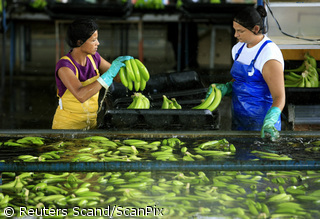Business leaders in Hungary are worried about the country's deteriorating investment climate
Published:
5 October 2003 y., Sunday
Business leaders in Hungary are worried about the country's deteriorating investment climate. Calls on the country's Central Bank to cut interest rates and on the government to curb state spending have so far gone unheeded.
All the Hungarians seem interested in is a major fraud and money-laundering scandal – and especially in the question: who's to blame?
The time when Hungary used to be a model scholar in the transition process to a free market economy has been over for some time. Recent governments - the last one (conservative) under Fidesz leader Viktor Orbán, and the incumbent (left-liberal) coalition led by Péter Medgyessy (no party affiliation) - seem caught up in inter-party squabbling rather than dealing with the necessary political and economic reforms prior to joining the European Union in May next year.
Central Bank governor Zsigmond Járai is becoming increasingly skeptical about the government's stated aim to join the euro zone by 2008. The Finance ministry is constantly coming up with economic growth predictions that have undergone downward adjustments – from 4 percent to 3 to 3.5, recently.
Last year's spring election, with its record turnout, demonstrated that a majority of Hungarians no longer supported Mr Orbán's us-Hungarians-we-are-the-greatest philosophy: by a slim majority voters preferred the alternative, a coalition of socialists and progressive liberals, led by the wealthy businessman-banker Mr Medgyessy.
Šaltinis:
rnw.nl
Copying, publishing, announcing any information from the News.lt portal without written permission of News.lt editorial office is prohibited.
The most popular articles
 The EBRD is increasing the availability of financing to the real economy in Hungary, with a €50 million credit line to CIB Bank, including at least €10 million equivalent denominated in Hungarian Forint.
more »
The EBRD is increasing the availability of financing to the real economy in Hungary, with a €50 million credit line to CIB Bank, including at least €10 million equivalent denominated in Hungarian Forint.
more »
 At the end of March 2010, AB Bank SNORAS deposit portfolio exceeded LTL 5 billion, of which over LTL 3 billion are household deposits.
more »
At the end of March 2010, AB Bank SNORAS deposit portfolio exceeded LTL 5 billion, of which over LTL 3 billion are household deposits.
more »
 In affirmation of Vietnam’s remarkable progress towards Middle Income Country status, the World Bank Board of Directors today approved a second loan for Vietnam from the International Bank of Reconstruction and Development (IBRD).
more »
In affirmation of Vietnam’s remarkable progress towards Middle Income Country status, the World Bank Board of Directors today approved a second loan for Vietnam from the International Bank of Reconstruction and Development (IBRD).
more »
 The World Bank today approved a EUR26 million loan to the Republic of Croatia aimed at further improving the efficiency of Croatia’s justice system − a necessary process in Croatia’s path towards successful European Union accession.
more »
The World Bank today approved a EUR26 million loan to the Republic of Croatia aimed at further improving the efficiency of Croatia’s justice system − a necessary process in Croatia’s path towards successful European Union accession.
more »
 The ACP-EU Joint Parliamentary Assembly asked the European Commission to help EU and ACP banana producers adapt to the new EU-Latin America trade agreement, which is expected to put an end to fifteen years of “banana wars” between the two continents, but has raised concerns for the livelihood of some regions' producers.
more »
The ACP-EU Joint Parliamentary Assembly asked the European Commission to help EU and ACP banana producers adapt to the new EU-Latin America trade agreement, which is expected to put an end to fifteen years of “banana wars” between the two continents, but has raised concerns for the livelihood of some regions' producers.
more »
 As seventeen of Africa’s 53 nations celebrate 50 years of independence in 2010, Africa’s “golden moment has come” and investors around the globe must look to the continent often painted only as risk-prone if they are to capitalize on business opportunities.
more »
As seventeen of Africa’s 53 nations celebrate 50 years of independence in 2010, Africa’s “golden moment has come” and investors around the globe must look to the continent often painted only as risk-prone if they are to capitalize on business opportunities.
more »
 During the ordinary general shareholders’ meeting of AB Bank SNORAS, which took place on 31st March 2010, the bank’s profit distribution was approved.
more »
During the ordinary general shareholders’ meeting of AB Bank SNORAS, which took place on 31st March 2010, the bank’s profit distribution was approved.
more »
 The EU is the world's largest economy, with enough international clout to return to "real capitalism" rather than resign itself to an alien "financial capitalism", concluded MEPs and experts at a public hearing held on Thursday by Parliament's special committee on the crisis.
more »
The EU is the world's largest economy, with enough international clout to return to "real capitalism" rather than resign itself to an alien "financial capitalism", concluded MEPs and experts at a public hearing held on Thursday by Parliament's special committee on the crisis.
more »
 Food quality and labelling are likely to be key issues when the Common Agriculture Policy is overhauled in the coming years.
more »
Food quality and labelling are likely to be key issues when the Common Agriculture Policy is overhauled in the coming years.
more »
 The European Investment Bank (EIB) is lending EUR 250 million to Russian company Enel OGK-5 to finance the upgrading of a gas fired power plant located in Nevinnomyssk, South Russia.
more »
The European Investment Bank (EIB) is lending EUR 250 million to Russian company Enel OGK-5 to finance the upgrading of a gas fired power plant located in Nevinnomyssk, South Russia.
more »